| Srl | Item |
| 1 |
ID:
137245


|
|
|
|
|
| Summary/Abstract |
This article questions the predominantly pessimistic assessments over the future of the Treaty on the Non-Proliferation of Nuclear Weapons (NPT). After analysing available evidence on states’ interests and interactions within the NPT’s framework, it argues that several negative expectations are unwarranted. Conversely, the article identifies three potentially threatening scenarios. Therefore, it scrutinizes the likely impact of reactive nuclear proliferation; analyses the probability of significant actors challenging the existent nuclear architecture; and explores whether the treaty’s enforcement might soon be diluted. The article concludes the NPT is unlikely to face fundamental threats in the foreseeable future.
|
|
|
|
|
|
|
|
|
|
|
|
|
|
|
|
| 2 |
ID:
165321
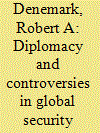

|
|
|
|
|
| Summary/Abstract |
In this work we identify elements of diplomacy as mechanisms with which to sharpen our understanding of security studies and weigh some claims regarding conflict. Diplomatic considerations have long been out of fashion in the field of global politics, and we seek to re- introduce them. In so doing, we situate ourselves within the general context of Goddard and Nexon's reformulation of security studies. We then identify two controversial questions in the security studies literature and consider them with reference to diplomatic interactions. The first of these is the argument raised by Jack Levy and William R. Thompson suggesting that great sea powers generate different balance of power dynamics than great land powers. We find support for the majority of their suggestions. The second controversy, closely associated with the work of T.V. Paul, concerns ‘soft balancing’ and arose to help explain the lack of balancing behaviors relative to the unipolar position of the United States after 1989. Soft balancing is controversial in part because identifying it requires us to understand the specific intent of various foreign policy actions. We use diplomatic activities to address the problem of intent, and find support for soft balancing in the diplomatic record.
|
|
|
|
|
|
|
|
|
|
|
|
|
|
|
|
| 3 |
ID:
106936
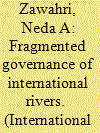

|
|
|
| 4 |
ID:
133649
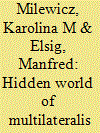

|
|
|
|
|
| Publication |
2014.
|
| Summary/Abstract |
Why do new EU democracies engage in multilateralism? The dominant explanation proposes that new democracies use international treaties to lock in domestic reforms. This article offers a novel explanation as to why new EU democracies participate in multilateral treaties. We argue that ratifying a treaty serves three external signaling purposes (recognition concerns, increasing strategic autonomy, and pleasing the European Union). We test our argument through a mix of quantitative and qualitative methods. First, we apply event history analysis. Drawing on a new ratification data set comprising 76 multilateral treaties, we illustrate the prominent role of new EU democracies in multilateralism as compared to other new democracies. Second, to assess the importance of external signaling in the decision to ratify multilateral treaties, we examine parliamentary ratification debates in selected Central and Eastern European countries. Third, we compare parliamentary discussions across European and non-European new democracies to demonstrate the different motives driving their approaches toward multilateralism.
|
|
|
|
|
|
|
|
|
|
|
|
|
|
|
|
| 5 |
ID:
113798


|
|
|
|
|
| Publication |
Bangladesh, Aparajita Sahitya Bhaban, 2011.
|
| Description |
xxxii, 206p.Hbk
|
| Standard Number |
9781463590888
|
|
|
|
|
|
|
|
|
|
|
|
Copies: C:1/I:0,R:0,Q:0
Circulation
| Accession# | Call# | Current Location | Status | Policy | Location |
| 056664 | 341.0265/BAN 056664 | Main | On Shelf | General | |
|
|
|
|
| 6 |
ID:
141288
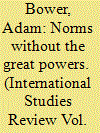

|
|
|
|
|
| Summary/Abstract |
In the past two decades, a series of major multilateral treaties were created in the absence of support—and often in the face of sustained opposition—from the United States and other emerging global leaders like China, India, and Russia. These institutions present a puzzle to prominent theories of IR because they fail to encompass predominantly powerful actors regarded as most consequential to the development and enforcement of international rules, raising questions as to their potential efficacy. This paper addresses the prospects for non-great power law in theoretical and empirical terms. I first draw on constructivist conceptions of international law as a social practice to demonstrate how multilateral treaties may generate powerful new social expectations and alter behavior even when they do not correspond to the prevailing distribution of material power in the international system. Treaties are embedded within an international social system composed of legal and non-legal elements, and these structural features generate social pressures that bear on formal members and non-parties alike. I then apply this account to an archetypal—and hard—case, the ban on antipersonnel mines. Contrary to skeptical assumptions, I demonstrate that the Mine Ban Treaty has instantiated a powerful new international social standard which has generated widespread behavioral change among treaty members—challenging accounts that emphasize enforcement by leading states—and non-parties including major military powers like the United States—challenging the view that great powers avoid new institutional developments not to their liking.
|
|
|
|
|
|
|
|
|
|
|
|
|
|
|
|
| 7 |
ID:
152991
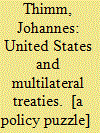

|
|
|
|
|
| Publication |
Colorado, FirstForum Press, 2016.
|
| Description |
vii, 287p.hbk
|
| Standard Number |
9781626375529
|
|
|
|
|
|
|
|
|
|
|
|
Copies: C:1/I:0,R:0,Q:0
Circulation
| Accession# | Call# | Current Location | Status | Policy | Location |
| 059073 | 341.02650973/THI 059073 | Main | On Shelf | General | |
|
|
|
|